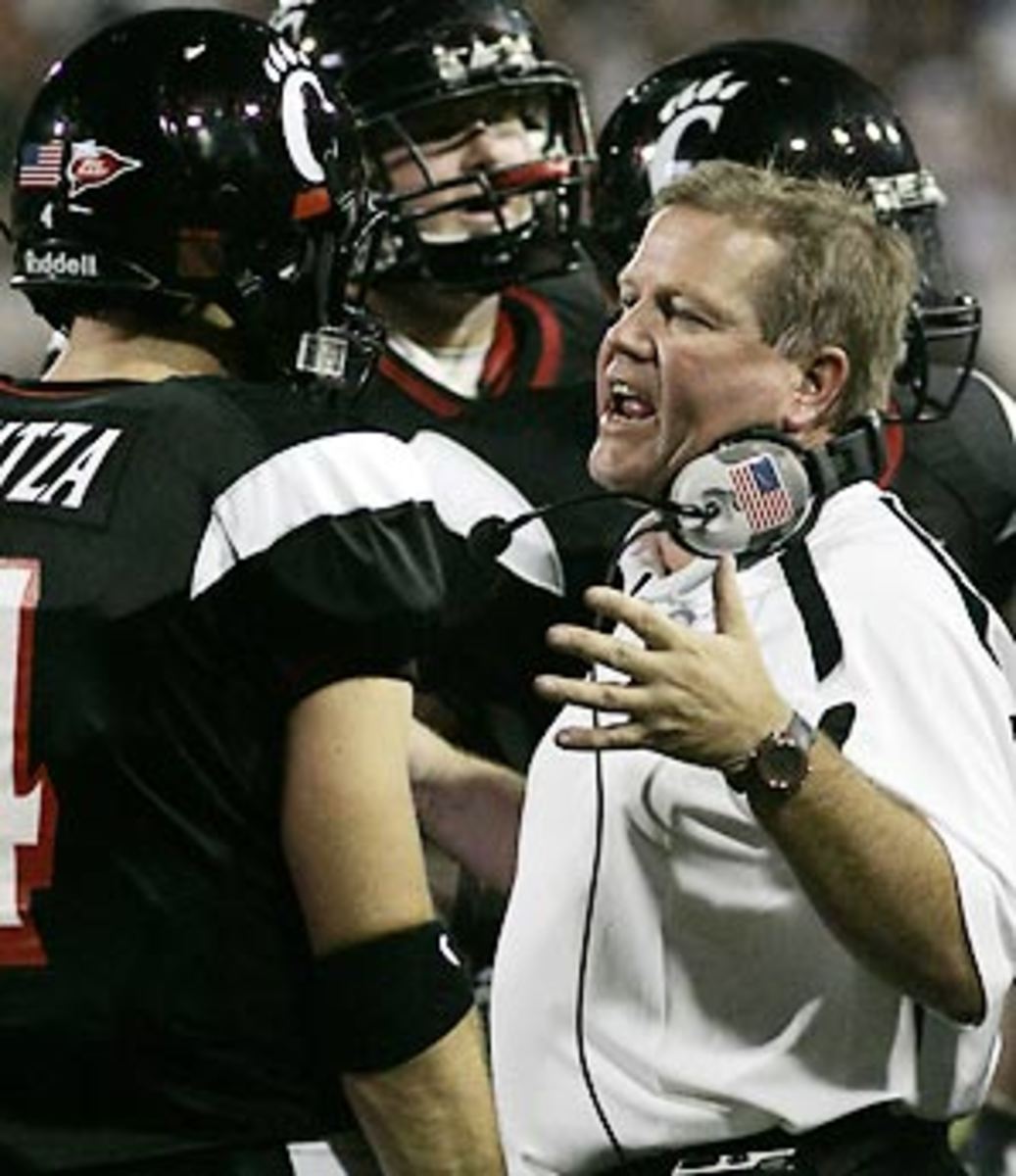Cincinnati coach draws on politics to form coaching philosophy


Brian Kelly likes to call his offense a coast-to-coast thing. He didn't play at a football powerhouse, he didn't apprentice for some coaching giant, and so the Cincinnati coach says formulating a scheme was about accumulating good ideas, regardless of where they came from.
Sort of like reaching across partisan lines.
"I guess you could look at it that way," Kelly said, chuckling out loud. Because, in a previous life, that's exactly the sort of line he'd be pulling out right now.
With an alderman for a father and a family passionate about politics, Kelly spent most of his formative years deployed on some campaign or another. He majored in political science at Assumption College in Worcester, Mass., he took the State Department's Foreign Service Exam and he jumped when a state senator asked him to be a legislative aide straight out of school. Then that senator, Gerry D'Amico, became Gary Hart's state coordinator for the 1984 presidential race and Kelly figured he'd really punched his ticket. He did advance work, he held press briefings and today, as the country ponders perhaps the most weighty presidential vote of this generation, he's living a different life.
"I would be less than truthful if I told you that I missed it," he said. "I follow it like any other person would given the circumstances and the needs we have as a country, but I got out of it for the right reasons."
It also helps that the things in politics he did like, Kelly has brought into coaching. In two years at Cincinnati, he's doubled the season ticket base and generated an almost Obama-esque grassroots following. The Bearcats for the first time have a legitimate student section and Kelly has made sure to stay true to his core "constituents."
"There's definite similarities [between coaching and politics], no question," he said. "The hat that I have to wear relative to selling our program and getting investors and energizing people to support our program is a lot like getting people to vote for you. When you decide to sell a season ticket, you've cast your vote financially. But you've also cast it because you believe in the message."
Being the man to deliver that message always appealed to Kelly. He got into politics because it was the family business, because he knew no other path. Really, though, he admits: "I wanted to be that person out front."
Kelly ultimately didn't get out of politics because he didn't see that happening one day. He decided to leave and try coaching because, in politics, "the message seemed to change every day." He called it a "win-at-all costs" mentality, he despised the attacking and even now, he doesn't do the obfuscation or cheery-painting the football coaches who are like politicians do.
One of the benchmarks he holds in his program is "eliminating confusion," a commitment to being a truly straight talker. He did it at Grand Valley State, while he was winning two Division II national titles, he did at Central Michigan, as he was winning a MAC title, and he's been doing it in his two years at Cincinnati, where he's 17-5.
While working for Hart's campaign, Kelly met with the traveling media, filling in details on the candidate's daily itinerary and acquiring, he said, an appreciation for being honest with the media. (And yes, Kelly won points with at least one reporter when he insisted, sufficiently earnestly, "I know a lot of coaches have this front that they have to put on with the media, but I learned then that the media is just like any other person, they have needs and wants and want to know what's going on.")
That facility with the press led him to pen a daily camp diary in the Cincinnati Inquirer, although there, he explained, "I can't get as detailed because they're obviously dynamics that go on with 18-22 year old kids that sometimes you can't share publicly."
Still, Kelly isn't so wary within his program, and that extends to all fronts. While he doesn't talk to his players about registering to vote or the importance of getting to the polls, he does push volunteerism and engagement in the community, believing their involvement will "help them make decisions and prioritize." It's also not uncommon for him to respond when a player asks his thoughts on a political issue.
"I really don't believe that that's anything that you need to keep guarded," he said. "Everybody's got their likes and dislikes and that doesn't bother me at all."
He let loose a sardonic little laugh when he heard about Florida's muzzling Brandon Spikes, a linebacker who'd been vocal in his support of Obama, last week. Kelly promised in his own program, "I would have no problem if someone wanted to talk to my players about their political views."
"We all get into emotional conversations about politics, religion or things like the right to choose. I think if you can't foster that in your players and allow them to seek their views, I think you're making a mistake," he said. "I could tell you from my standpoint, if somebody on my team wanted to wear a McCain T-shirt, as long as it didn't become a distraction to him, I don't have any problem with that."
And in the end, being open to that, and watching that political maturation up close was why he traded placards for clipboards. Kelly refuses to believe one profession has more value, or is more impacting, than the other.
"The big difference is preparing hundreds of kids over my 18 years of college football to be in leadership positions, whether it be state or local, or national. It gives me that opportunity to provide what I would consider the right things in their development," he said. "It's a difference between shaping policy and shaping young men."
